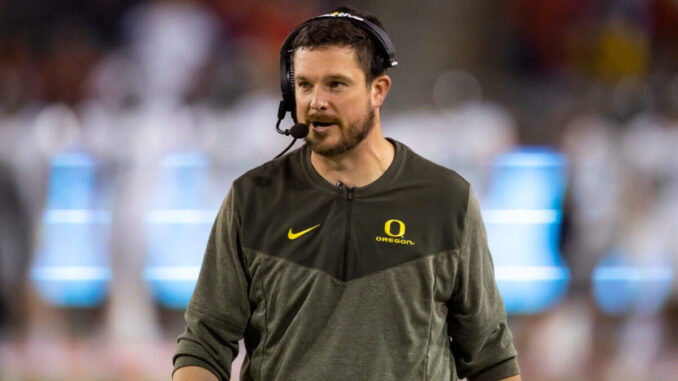
Due to his wife’s serious health issues and multiple salary complaints, Dan Lanning made the decision to leave Oregon Ducks football.
In a stunning development that has sent shockwaves through college football, Oregon Ducks head coach Dan Lanning has stepped down from his position. The decision, according to reports, was driven by two pressing concerns: his wife’s serious health struggles and his ongoing dissatisfaction with salary and contract-related issues. The combination of these personal and professional factors ultimately compelled Lanning to make the difficult call to part ways with the program.

Lanning, who took over the Ducks program with high expectations, had quickly established himself as one of the most promising young coaches in the country. Known for his defensive expertise and dynamic recruiting style, he brought fresh energy and championship-level ambitions to Eugene. Under his leadership, Oregon not only competed at the top of the Pac-12 but also became a consistent presence in national conversations. His departure, therefore, leaves a significant void for the team and its fans.
The personal side of this decision has resonated deeply with players and supporters alike. Sources close to the family revealed that Lanning’s wife has been facing serious health challenges, requiring his increased attention and support at home. Balancing the demanding schedule of a head coach—often involving long days, intense travel, and constant media obligations—with the need to prioritize family proved nearly impossible. Lanning’s choice to step away demonstrates a commitment to family values, even amid the enormous pressures of college athletics.
At the same time, frustration with salary matters added further strain to the situation. Despite his impressive record and the national buzz he generated, Lanning had reportedly voiced concerns over compensation and resources compared to other top-tier programs. College football has become a high-stakes financial arena, and Lanning felt that his pay and support did not align with the results he delivered. While the Oregon athletic department had engaged in negotiations, the gap between expectations and reality seemed to widen, leaving Lanning discontented.
This dual burden—personal crisis and professional tension—became unsustainable. “Dan Lanning has given everything to Oregon football, but at this moment, his family must come first,” a source close to the program stated. That sentiment has echoed across the college football landscape, with colleagues, former players, and analysts expressing both admiration for his priorities and disappointment at losing a talented leader from the sidelines.
For Oregon, the timing could not be more difficult. Recruiting season is in full swing, and player morale will undoubtedly be tested by the sudden absence of their coach. The athletic department now faces the urgent task of finding a replacement capable of continuing the Ducks’ upward trajectory. Fans are left with mixed emotions—understanding of Lanning’s circumstances but worried about the future of a program that seemed poised to make a serious national push.
Ultimately, Dan Lanning’s decision underscores the human side of sports. Behind the bright lights of packed stadiums and the pressure of national rankings, coaches and athletes face challenges that go far beyond the game. For Lanning, prioritizing his wife’s health and addressing his professional grievances meant stepping away from Oregon. His departure will be remembered not only as a major turning point for the Ducks but also as a reminder that personal well-being must always come before wins and losses.
Leave a Reply